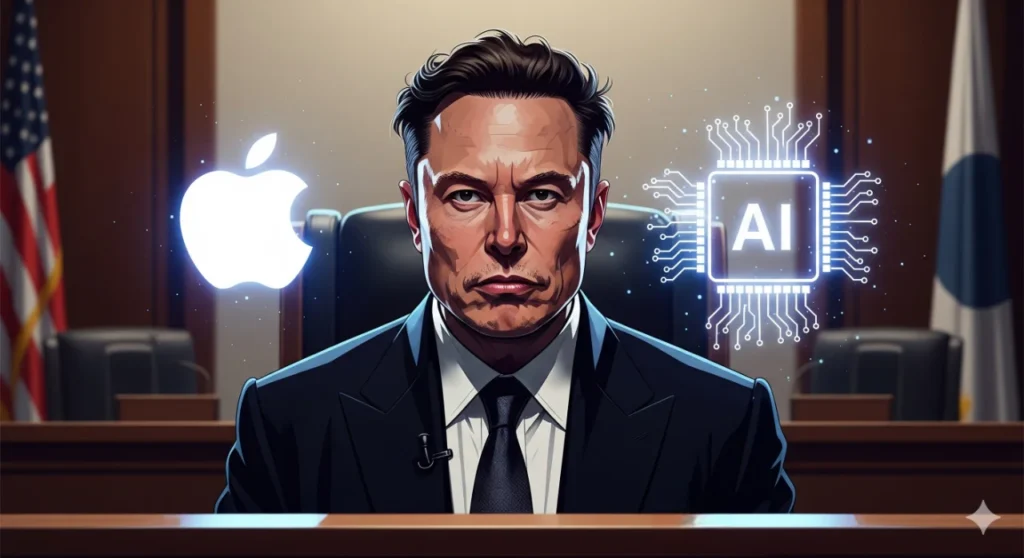Elon Musk’s AI startup xAI has taken Apple and OpenAI to federal court in Texas, alleging they conspired to block rivals in the fast-growing AI market.
Filed on August 25, the lawsuit claims Apple’s exclusive ChatGPT integration locked competitors like xAI’s Grok out of the App Store spotlight—potentially setting the stage for a landmark antitrust battle in artificial intelligence.
Key Takeaways
- Musk’s xAI sues Apple and OpenAI for alleged AI market collusion.
- Lawsuit filed in Texas federal court seeks billions in damages.
- Apple’s exclusive ChatGPT deal called “monopolistic” by xAI.
- Experts say case could define AI’s role in U.S. antitrust law.
- Musk accuses Apple of suppressing Grok’s visibility in App Store.
Elon Musk’s xAI has sued Apple and OpenAI in U.S. federal court, claiming they conspired to suppress competition in AI through exclusive App Store deals. The case, filed August 25, could become a landmark test of whether U.S. antitrust law applies to artificial intelligence platforms and app store rankings.
Musk’s xAI Launches Legal Strike Against Apple and OpenAI
Elon Musk has escalated his rivalry with Silicon Valley by filing a lawsuit against Apple and OpenAI, accusing them of illegally conspiring to monopolize the artificial intelligence market. The case, lodged in Texas federal court on August 25, seeks billions of dollars in damages.
According to the complaint, Apple’s exclusive integration of OpenAI’s ChatGPT into iOS and macOS unfairly disadvantaged rival products such as Musk’s Grok chatbot. “If not for its exclusive deal with OpenAI, Apple would have no reason to refrain from more prominently featuring the X app and the Grok app in its App Store,” the lawsuit states.
Allegations of Market Lock-In
The lawsuit centers on Apple’s June 2024 announcement that ChatGPT would be embedded across its devices. xAI argues this deal has “locked up markets to maintain monopolies” and deprived consumers of alternatives.
Musk doubled down on X, his social platform, writing: “A million reviews with 4.9 average for @Grok and still Apple refuses to mention Grok on any lists.”
Antitrust lawyers note Apple already faces scrutiny for its control over the App Store, including its payment systems and app rankings. This case adds AI to the legal battlefield.
Industry Response and Pushback
OpenAI dismissed the lawsuit as harassment. “This latest filing is consistent with Mr. Musk’s ongoing pattern,” a company spokesperson said. Apple has not yet issued an official comment.
OpenAI CEO Sam Altman, in a separate post earlier this month, implied Musk’s claims were hypocritical given his control of X.
Expert Insights: Why This Case Matters
Legal scholars say the case could become the first to define AI as a specific market for antitrust law. “It’s a canary in the coal mine in terms of how courts will treat AI,” said Christine Bartholomew, law professor at the University at Buffalo.
Herbert Hovenkamp of the University of Pennsylvania added Apple may defend its decision as a legitimate business move, citing operational and security reasons for selecting OpenAI as its AI partner.
Background You Need
Musk cofounded OpenAI in 2015 but left amid disagreements over its direction. He has since sued OpenAI and CEO Sam Altman in California, arguing the firm unlawfully shifted from nonprofit to for-profit.
Launched less than two years ago, xAI competes with OpenAI, Microsoft-backed AI platforms, and Chinese rival DeepSeek. Musk has integrated Grok into Tesla vehicles and folded X into xAI operations after acquiring the social platform for $33 billion in March 2025.
Market Reaction
Apple’s stock barely moved on news of the lawsuit, rising 0.6% by midday trading in New York. Tesla shares gained 1.2%, while OpenAI remains private.
The Bigger Picture
This case could reverberate far beyond Silicon Valley. If courts recognize AI integration as a market subject to antitrust protections, it could reshape how tech giants design partnerships, distribute apps, and bundle services with hardware.
What Happens Next
The lawsuit will test whether courts see Apple’s integration of ChatGPT as innovation or exclusion. If successful, Musk could win damages and force Apple to adjust how it features rival apps.
But legal experts caution such antitrust cases take years and often hinge on proving consumer harm, not just competitor frustration.
Conclusion
Elon Musk’s legal battle with Apple and OpenAI is more than a personal feud—it’s a test case for whether AI platforms fall under the same antitrust scrutiny as app stores and operating systems. The outcome could set the rules for how emerging AI services compete—or get locked out—in the global tech ecosystem.
